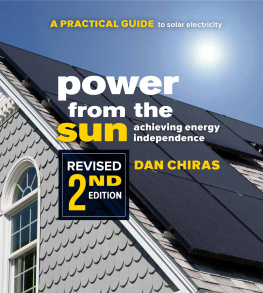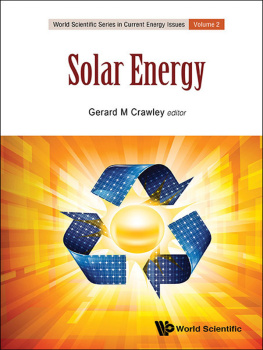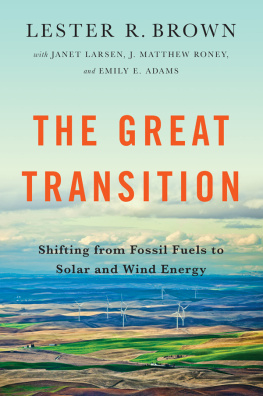Rooftop Revolution
Rooftop
Revolution
How Solar Power Can Save
Our Economyand Our Planet
from Dirty Energy
Foreword by Wesley K. Clark,
Retired US Army General and NATOs Former
Supreme Allied Commander, Europe
Danny Kennedy

Rooftop Revolution
Copyright 2012 by Danny Kennedy and Sungevity
All rights reserved. No part of this publication may be reproduced, distributed, or transmitted in any form or by any means, including photocopying, recording, or other electronic or mechanical methods, without the prior written permission of the publisher, except in the case of brief quotations embodied in critical reviews and certain other noncommercial uses permitted by copyright law. For permission requests, write to the publisher, addressed Attention: Permissions Coordinator, at the address below.

| Berrett-Koehler Publishers, Inc.
235 Montgomery Street, Suite 650
San Francisco, California 94104-2916
Tel: (415) 288-0260, Fax: (415) 362-2512
www.bkconnection.com |
Ordering information for print editions
Quantity sales. Special discounts are available on quantity purchases by corporations, associations, and others. For details, contact the Special Sales Department at the Berrett-Koehler address above.
Individual sales. Berrett-Koehler publications are available through most bookstores. They can also be ordered directly from Berrett-Koehler: Tel: (800) 929-2929; Fax: (802) 864-7626; www.bkconnection.com Orders for college textbook/course adoption use. Please contact Berrett-Koehler: Tel: (800) 929-2929; Fax: (802) 864-7626.
Orders by U.S. trade bookstores and wholesalers. Please contact Ingram Publisher Services, Tel: (800) 509-4887; Fax: (800) 838-1149; E-mail: customer.service@ingram publisherservices.com; or visit www.ingrampublisherservices.com/Ordering for details about electronic ordering.
Berrett-Koehler and the BK logo are registered trademarks of Berrett-Koehler Publishers, Inc.
First Edition
Paperback print edition ISBN 978-1-60994-664-7
PDF e-book ISBN 978-1-60994-665-4
IDPF e-book ISBN 978-1-60994-666-1
2012-1
Cover design by Kirk DouPonce, DogEared Design.
Interior design and composition by Gary Palmatier, Ideas to Images.
Elizabeth von Radics, copyeditor; Mike Mollett, proofreader; Medea Minnich, indexer.
To my daughters, Aiko and Ena Jun, and their future childrens
great-great-great-great-grandchildren.
Contents
Role Models for
the Rooftop Revolution
Foreword
by General Wesley Clark, US Army (ret.)
T HE U NITED S TATES TODAY FACES A HISTORIC OPPORTU nityan opportunity every bit as wonderful as Henry Fords development of mass production or Thomas Edisons invention of the light bulb. These economic achievements led to mass literacy, an acceleration of learning, the creation of the vast American middle class, and ultimately the suburbanization of the United States.
Todays opportunity is in the field of clean energy, using the modern technologies developed since the first energy crisis in the 1970s to create an America awash in a new prosperity, with an economy bursting with the most plentiful, accessible, and least expensive power source in the world. Properly applied, this energy could spell untold new manufacturing, informational, and transportation technologies. High-tech industries and entrepreneurs from all over the world would locate here, sparking an economic and educational renaissance for the United States that would catapult us firmly as a role model and an unquestioned future leader into the twenty-first century.
Danny Kennedys book, Rooftop Revolution, is the story of the technologies surrounding one of these energy sources: solar power. He covers in illuminating depth and with jaunty prose the innovations, economics, and politics of the solar-energy industry and in so doing provides some deep insight into the challenges and the opportunities facing the United States today.
The challenge of energy is not just a matter of economics, though economics is certainly a part of it. As the nation moved from electric lighting to electric-powered heavy industry and then into the Information Age, and from sweltering summers to ever-present air-conditioning, electricity went from being a luxury to a necessity to a vital foundation for the future. But the nations supply has not kept pace with either demand or the opportunities ahead.
The utility industry is for the most part heavily regulated, fragmented, and obsolescent in structure and performance. Reliant largely on fossil-fueled steam generation from mammoth plants and a patchwork of wiring called the grid, the systemif it can even be called thatis inefficient, expensive, stubbornly resistant to modernization, and almost always on the brink of overload and failure. Consumers demand low rates; utility companies, protected usually by public service commissions, fight investments and change; and politicians cater to electoral forces.
Enter the new solar technologythe fastest-developing energy technology today, whose price has fallen dramatically and which promises continued reduction, beyond the point where it will likely be cheaper to add rooftop solar to homes, schools, and factories than to supply them with centrally generated electric power. Indeed it is likely that new generation will be most efficiently managed on a distributed basis and sold into the grid, rather than bought from the grid.
But there are formidable political, regulatory, and bureaucratic obstacles to this vision. And these too are part of Kennedys story.
On the larger scene, the United States has a dismal legacy of more than 40 years of failure in hammering out a sensible energy strategy, not only for electricity but for liquid fuels as well. Dependent for decades on between 9 million and 12 million barrels of imported fuel, the United States has squandered lives, treasure, and legacy in grasping for foreign-sourced petroleum while sitting on the most abundant energy resources and intellectual and entrepreneurial capital in the world.
Three wars, some 7,000 US military deaths, and several trillion dollars spent on conflict, military presence, and fuel imports attest to our failure. Companies that once employed proud and stalwart US citizens are now funnels channeling US fuel expenditures to foreign dictators and others whose governments benefit in direct proportion to Americas economic pain. And in the process, they are agents of distortion of US strategy and policy, conveying a false sense of the real challenges and opportunities facing us in the future and reinforcing their own commercial interests with the most powerful accumulation of wealth in the world.
In less than two presidential terms, with scarcely any expenditure of US government monies, the United States could be energy independent. The gold rush in North Dakota today, as thousands of workers pour into the state seeking lucrative jobs in the new oil sector, powered by private investment, indicates the hunger for energy and the drive to satiate it.
But we also must take seriously the rising carbon content in the atmosphere and the even more dangerous buildup of other greenhouse gases like methane. So, while using energy independence as a rallying cry to jump-start the economy, we have to simultaneously transition away from fossil fuelsno easy task with a trillion-dollar inventory of liquid-fueled private automobiles. And the electricity that powers them must be renewably generated rather than drawn from fossilized carbon. But, again, we have the technology to do this.
Next page








